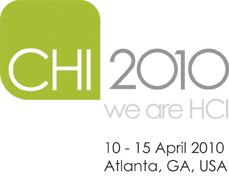CN16: Addressing Value Tensions During The Design Process
Quick Facts
Time: Wednesday, 14 April 2010, 9:00 to 13:00Units: 2
Organizers: Alan Borning, Batya Friedman, Lisa P. Nathan,
Benefits
Through this course attendees will learn methods for identifying and addressing value tensions during the design and implementation of interactive technologies. Specifically, the course will focus on strategies for navigating the tensions between security and privacy.Audience
No specific background is required. It is anticipated that the course will be of primary interest to design practitioners, educators, and researchers who want to learn an established method for identifying and addressing value tensions.Origins
Offered as a one credit course at CHI 2009. Course reviews strongly suggested attendees thought the course was too short and should be provided a longer time slot. Course materials modified from graduate level courses on Value Sensitive Design at the University of Washington.Features
- Overview of Value Sensitive Design theory and the concept of value tensions
- Introduction to identifying and addressing value tensions
- Presentation of Value Dams and Flows method
- Discussion of the specific challenges of privacy and security including a framework that accounts for situation, context, and a person's stage-of-life
- Practical tips for user studies, interview protocols, and data analysis
Instructors
- Dr. Alan Borning is a Professor in the Department of Computer Science & Engineering at the University of Washington, and an Adjunct Professor in the Information School. He received a BA degree from Reed College in mathematics 1971, and a Ph.D. from Stanford University in Computer Science in 1979. His current research interests are in human-computer interaction, particularly as applied to land use, transportation, and environmental modeling, and in using and extending Value Sensitive Design in this work.
- Dr. Batya Friedman is a Professor in the Information School and an Adjunct Professor in the Department of Computer Science and Engineering at the University of Washington where she directs the Value Sensitive Design Research Laboratory. She received both her BA (1979) and Ph.D. (1988) from the University of California, Berkeley. Batya’s work on Value Sensitive Design has focused on the values of informed consent, privacy in public, trust, freedom from bias, moral agency, and human dignity, and engaged such technologies as web browsers, large displays, urban simulation, robotics, open-source code bases, and location-enhanced computing.
- Dr. Lisa P. Nathan is an Assistant Professor at the School of Library, Archival and Information Studies at the University of British Columbia, Canada. She holds a B.A. in Education, an M.S. in Library and Information Science, and a Ph.D. in Information Science from the University of Washington. Lisa’s empirical work includes a two year investigation of value tensions around changing information technology practice within sustainability-oriented intentional communities. Her design work focuses on the development of value scenarios, the envisioning criteria, and the Envisioning Cards in an effort to create agile methods for envisioning the systemic effects of new technology to guide design and policy decisions.



